The wheelchair racer on her need for speed and what sport has taught her about identity in Christ
When London hosted the Olympics and Paralympics in 2012, it was like all my Christmases had come at once. I remember the feeling of joy when I acquired tickets to watch the hockey and basketball (despite having minimal interest in either sport). That feeling intensified when I added tickets for the athletics, swimming and cycling at the Paralympics, allowing me access to the stadia I’d seen so much of on TV.
The motto of the Games was “Inspire a Generation”. And for one eleven-year-old from Coventry whose disability meant she’d never been allowed to play sport at school, this slogan became a reality.
Just four years after watching London 2012, Karé Adenegan would win three medals in the 2016 Rio Paralympics. In Tokyo, she added two more. Now 23, the softly spoken wheelchair racer is bidding for a medal in her third successive games. When we speak during her final preparations for Paris 2024, I ask if she can sum up her remarkable journey in one word. “Mind-blowing,” she says simply.
Adenegen was born with cerebal palsy – a neurological condition which impacts muscle movement. She was brought up in a loving Christian home, and her faith has been a constant during difficult times.
As a professional athlete, she’s broken world records, competed at major international championships and was crowned BBC Young Sports Personality of the Year in 2018. But she insists that despite her achievements, she finds her value in her creator rather than her sporting success.
She credits her strong faith to having a good Christian community around her. At university, she had a strong friendship group which included fellow believers. Today she worships at Mosaic Church in Coventry as well as taking part in programmes run by Christians in Sport while competing away from home.
The Paralympic gold has always been the dream
Adenegen will compete in both the 100m and 800m at the Paris Games this summer, where she’ll come up against Hannah Cockroft. Her compatriot won each of the races that Adenegen medalled in at the Rio and Tokyo Games. “It definitely spurs me on,” she says, speaking of what could be seen as a rivalry. “But it’s possible to love your competitors and be the best, to be fiercely competitive and do it for God’s glory.”
The famous movie Chariots of Fire dramatises the words of Eric Liddell: “When I run, I feel [God’s] pleasure.” They are words that connect with Adenegen but, for her, its more about seeing the journey God has brought her on.
“In the past I questioned my disability, questioned God and questioned my purpose. But I recall being on the track and having a sense of: Wow, God, you’re with me, and you brought me here.” It’s knowing God is with her that makes everything truly worthwhile, she says.
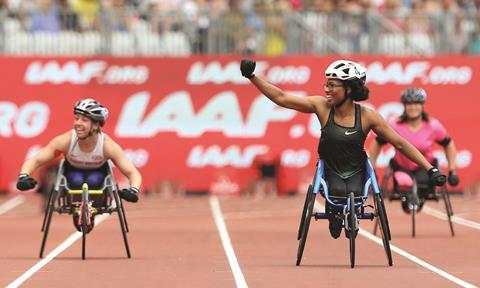
Tell me about your life growing up.
I was very much brought up in the church and in a Christian household, so faith has always been a normal thing for me.
I was born prematurely with cerebral palsy. I have diplegia, which is a neurological condition affecting movement in the body. It affects my legs and causes them to be quite stiff, so I have to use a wheelchair.
What was school like?
It was challenging. I was the only wheelchair user in primary school and preschool.
Sport was one of the areas I realised I was different, because my friends would be doing PE lessons and I’d have to stay inside.
Dealing with disability meant I had lots of questions for God
There were parts of the playground I couldn’t access, so I remember being by myself a lot during lunch times and thinking: I just want to do what everybody else is doing. Because of my disability that was a limitation.
Growing up you don’t really want to be different. You want to be a part of the group. So I did feel very isolated – at times quite lonely, as well.
Sometimes when people are told they can’t do something, it makes them more determined to prove people wrong. Is that what happened for you?
Yeah, definitely. Watching the London 2012 Paralympic Games, I was so inspired by what I saw. There was something in me that said: I want to prove people wrong. I want to be out there doing sport at a high level.
I went from literally watching my friends do sport and thinking it wasn’t for me, to seeing the Games and being launched into this world of elite sport.
What really got me was the fact that I saw people in wheelchairs going really, really fast. I was about seven years old when I got my first wheelchair, and I remember whizzing around my primary school and my teachers saying: “Slow down!”
I always had this desire to be fast. So when I realised it [wheelchair racing] was a sport, I knew it was for me. Nobody’s going to tell me off for going fast on an athletics track!
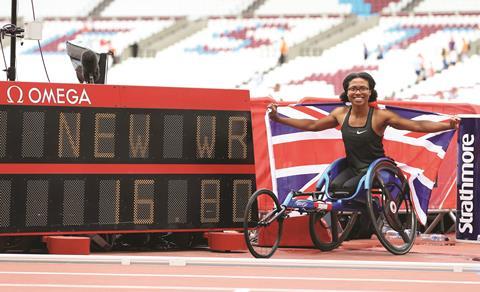
Your first Paralympics was Rio in 2016. What are your memories of that?
I was a bit of a fan girl, because I wanted selfies with all the athletes! I remember seeing Ellie Simmonds [British Paralympic swimming gold medallist] and David Weir [British Paralympic wheelchair gold medallist] and thinking: Wow, I’m on a team with these people! I’d been watching them on TV for years.
I remember being on the start line and just thinking: This is a dream come true. I felt very blessed to be in that moment.
How has your faith changed over time?
I had that moment of praying the prayer when I was ten years old, so I believed in Jesus, but I had ups and downs after that.
Dealing with disability meant I had lots of questions for God around: What’s my purpose in life?
When I went into secondary school, I had moments of doubting God, especially because I did A-level philosophy, where there were lots of big questions, like: Does God really exist?
Were you able to find answers to those questions?
Yes and no. Part of faith is knowing God is good and trusting that God’s will is good. I think sport has been a place where God has said: “You can see some of my purposes in your life.”
It has been a door to a platform to develop myself and share my faith. God will use all things – even things we think are weaknesses or negative things. That’s how I’ve been able to reconcile disability and my faith.
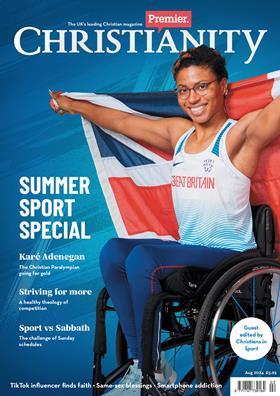
You’ve said the Covid lockdowns marked a significant moment in your faith journey. What happened?
Up until that point, it had felt like there was a security around sport – you knew the Olympics were definitely happening in 2020. And then, as we know, it didn’t!
Through that shaking of sport, I realised that God is the only firm thing there is. That was a time that really got me rooted in my faith.
What Bible verses have helped you?
One story I’ve pointed to quite a lot is Jesus with the blind man [John 9]. There were those around him saying: “Why is he like this? Is it something his parents have done, is it a sin?” And Jesus said no, “this happened so that the works of God might be displayed in him.” Obviously Jesus heals him, but there’s that sense of all things are for the glory of God. I think that’s amazing.
Doing this sport for God’s glory has always stuck with me, knowing that God will be glorified in everything.
Do you like winning?
Um, yeah!
I know it’s an odd question to ask. How do you balance that with giving God the glory, and not taking it for yourself?
That is a tension sometimes. I do want to be the best athlete possible. I do want to win; I do want to succeed.
But this year especially, I’ve realised [that I want] to preserve what I’ve achieved and hold on to the reputation I’ve built. I do feel like God’s really challenged me to let go of some of that ambition and just do what’s in my control – and trust that the outcome, whatever it is, is in God’s hands.
I’ve learned that it’s more about consecrating and surrendering my ambition to God. It’s about recognising God’s will and God’s plan for my life.
Is there something freeing about being able to hand over the outcome to God and just focus on being the best version of yourself?
There is so much freedom when you let go of the outcome. It doesn’t mean that you’re going to win everything and always be successful. But it means you can trust the outcome is going to be a good one, because you have faith in a sovereign Father who is working for good in your life.
Do you think God has provided you with a platform so you can share your faith?
Sport is very much a secular space, but people are genuinely interested in the lives of athletes and want to know what motivates us. So that gives me a great opportunity to share my faith because, as a Christian, everything I do very much revolves around my faith, and it’s natural to talk about it.
So if you’re at the Paralympics and another athlete says: “I’ve heard you’re a Christian – why do you believe all that stuff?” What do you say?
One thing that I point to a lot is the way that everything around us is so unpredictable and unstable. When it comes to knowing Jesus and what Jesus has done, there’s a sense of that firm hope we have, and the security we have in him.
We have a secure identity in Christ. It’s more about what Christ has done than anything we’ve done. We’re not trying to earn it by our own performance – and that message is so liberating for athletes to hear.
Recently, I’ve been really encouraged by Colossians 2:9-10, which talks about Jesus being the fullness of God’s being. Then it says that we’ve been “brought to fullness” through Christ ourselves and we’re “complete in Christ”. That’s so encouraging because in sport, it’s easy to think: The achievements are going to complete me or: Once I’ve got that gold medal, I’m sorted.
It’s been so encouraging to remember that my value is in Christ. That’s something I can really hold onto and have as an encouragement as I’m going into the Games.
A sporting career has many ups and downs. How does being a Christian help you handle disappointments?
There’s a real unpredictability in sport. You might have a world record one year, and then you don’t.
Disappointment provides us with opportunities to build our character. Being honest, even going into these games, I’m not quite in the form I want to be in right now. But there’s definitely that sense of: OK, God, you’re actually going to teach me more about yourself. And I can be more like you in this situation. I can grow in character.
That’s really positive, even in difficult times.
What are your biggest goals?
The Paralympic gold has always been the dream. But also, it’s always about bettering myself – especially in the 100 metres. That was the event I got the world record in [in 2018]. I haven’t gone that fast since so, really, my desire is to get back there.
Has that been hard to wrestle with – that you haven’t equalled a personal best from so long ago?
It’s challenging. I’ve looked back at that race many times and thought: How can I replicate that? I wish I knew! I’m still working on it now, but that’s why sport is great – it’s a test of character. It’s a test of patience. I’m always learning. It’s that sense of having to push and work, day in day out, and have that perseverance.
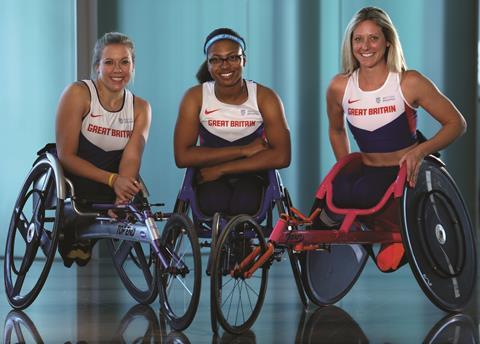
You’ve won silver and bronze medals at previous Olympics. Do you think you can achieve gold in Paris?
I’m a firm believer that if you don’t believe you can win gold, you can’t win gold. So I definitely have the mindset that it’s possible.
I’m training as hard as I can and hoping that I can challenge for gold. But really, it’s just about being the best version of myself, focusing on my process and hopefully getting a good outcome.
What are you praying for at the moment?
I’ve been really honest with God about where I am, and about the disappointment, but also thanking God for the positive sessions and when I’m enjoying it. Ultimately, on the start line, every time, my prayer is: “Your will be done.” That’s all I say.
To hear the full interview listen to Premier Christian Radio at 8pm on Saturday 10 August, or download ‘The Profile’ podcast premier.plus/theprofile
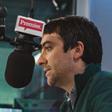












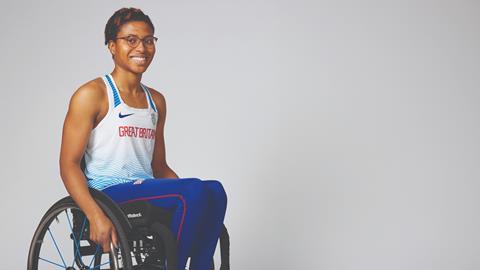

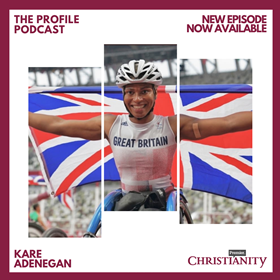

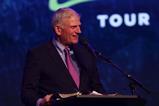
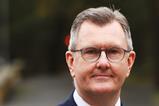




















No comments yet